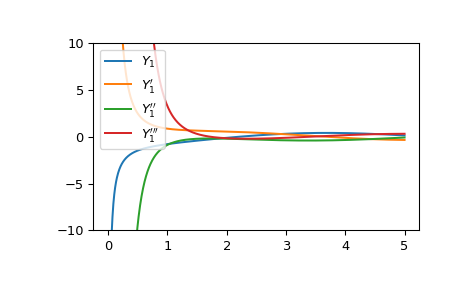yvp#
- scipy.special.yvp(v, z, n=1)[source]#
Compute derivatives of Bessel functions of the second kind.
Compute the nth derivative of the Bessel function Yv with respect to z.
- Parameters:
- varray_like of float
Order of Bessel function
- zcomplex
Argument at which to evaluate the derivative
- nint, default 1
Order of derivative. For 0 returns the BEssel function
yv
- Returns:
- scalar or ndarray
nth derivative of the Bessel function.
See also
yvBessel functions of the second kind
Notes
The derivative is computed using the relation DLFM 10.6.7 [2].
References
[1]Zhang, Shanjie and Jin, Jianming. “Computation of Special Functions”, John Wiley and Sons, 1996, chapter 5. https://people.sc.fsu.edu/~jburkardt/f77_src/special_functions/special_functions.html
[2]NIST Digital Library of Mathematical Functions. https://dlmf.nist.gov/10.6.E7
Examples
Compute the Bessel function of the second kind of order 0 and its first two derivatives at 1.
>>> from scipy.special import yvp >>> yvp(0, 1, 0), yvp(0, 1, 1), yvp(0, 1, 2) (0.088256964215677, 0.7812128213002889, -0.8694697855159659)
Compute the first derivative of the Bessel function of the second kind for several orders at 1 by providing an array for v.
>>> yvp([0, 1, 2], 1, 1) array([0.78121282, 0.86946979, 2.52015239])
Compute the first derivative of the Bessel function of the second kind of order 0 at several points by providing an array for z.
>>> import numpy as np >>> points = np.array([0.5, 1.5, 3.]) >>> yvp(0, points, 1) array([ 1.47147239, 0.41230863, -0.32467442])
Plot the Bessel function of the second kind of order 1 and its first three derivatives.
>>> import matplotlib.pyplot as plt >>> x = np.linspace(0, 5, 1000) >>> x[0] += 1e-15 >>> fig, ax = plt.subplots() >>> ax.plot(x, yvp(1, x, 0), label=r"$Y_1$") >>> ax.plot(x, yvp(1, x, 1), label=r"$Y_1'$") >>> ax.plot(x, yvp(1, x, 2), label=r"$Y_1''$") >>> ax.plot(x, yvp(1, x, 3), label=r"$Y_1'''$") >>> ax.set_ylim(-10, 10) >>> plt.legend() >>> plt.show()
